False Facts About Overcooked Eggs You Thought Were True
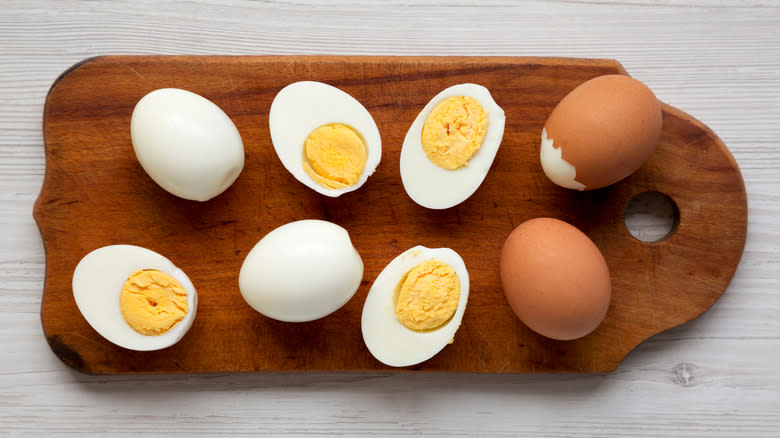
You've likely overcooked eggs a time or two in your life, and you'll likely do it again until you separate the truth from the facts concerning overcooking them. The point where eggs go from being perfect to overcooked can feel lost in a frustrating grey area if you don't understand what got them there. Some people even throw away overcooked eggs thinking they're neither good nor safe to eat. But once you understand the intricacies of overcooked eggs, we think you'll make better cooking choices in the future. Even if you end up letting your eggs overcook by seconds or minutes yet again, they might still be salvageable.
These myths can raise a lot of questions. Can you eat a green yolk? Is there something you can add to scrambled eggs to keep them soft? Does overcooking cause nutrient loss? Join us on a journey to learn more about overcooked eggs and figure out what "facts" turned out to be myths after all.
Read more: 15 Mistakes Everyone Makes When Cooking Eggs
False: You Can't Overcook Eggs When Boiling
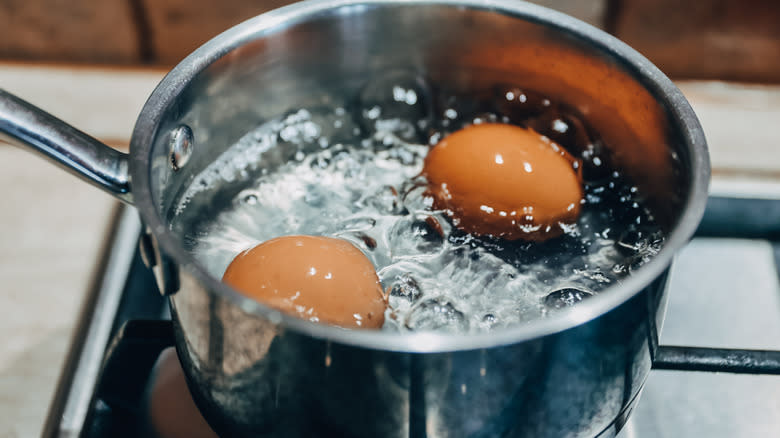
Redditor u/hotstickywaffle came to the Reddit community needing to settle a disagreement with their wife. She swore "that when hardboiling eggs you can't over cook them, that you could leave them in there for 2 hours and it wouldn't make a difference." If you've ever gotten into a similar argument, we're here to settle it. You can't just throw eggs into boiling water and pull them out whenever you like, expecting the same results every time. Just like it's possible to undercook eggs with this method, it's also possible to overcook them when boiling.
The longer you leave eggs in the water to boil, the more changes they're going to undergo in texture, flavor, and even color. If you go beyond a normal boiling time, egg proteins start to loosen and then combine with each other in strong bonds. The same process that helps them change from runny to firm continues the longer you boil them, resulting in even more firm and ultimately more rubbery eggs. As the proteins become tighter, they squeeze out water and make the egg dry.
If your goal is to boil an egg and get predictable results, you're better off with a timer. Our perfect boiled eggs take about 12 minutes to make.
False: Eggs Stay The Same Color No Matter How Long You Cook Them
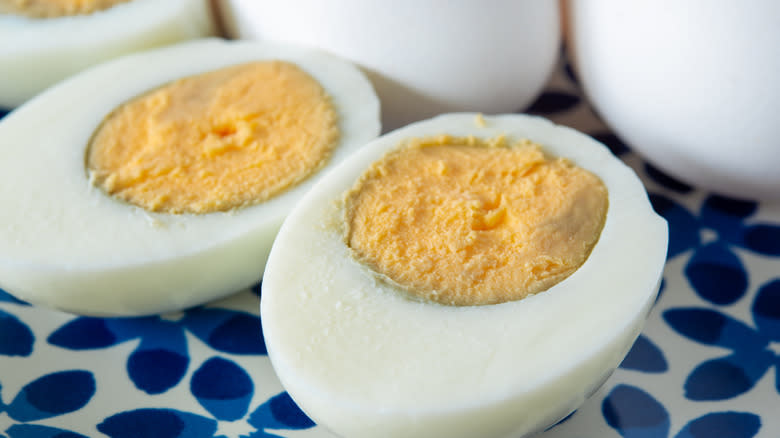
One of the changes eggs undergo as you cook them is their color. The first color change you'll notice is the yolk turning greenish-grey. Eventually, if you cook it long enough, even the egg white will turn a tan brown. This is entirely because of chemical reactions that happen during the cooking process.
The older your egg and the longer you cook it, the more likely you are to end up with a greenish-grey yolk. Even scrambled or steamed ones can turn green with enough time. After 15 or more minutes of cooking, sulfur in the white reacts with iron from the yolk to create ferrous sulfide (iron sulfide). Since older eggs have more alkaline whites, you'll want to watch the time even more closely, since this reaction will happen faster. When boiling, avoid sulfurous green yolks by cooling boiled eggs with an ice bath to stop the cooking process. However, sometimes the yolks will turn green simply because your water has a high iron content.
You may be surprised to learn that the reason the white portion eventually turns light brown is the same reason food browns in the oven — the Maillard reaction. The tiny amount of sugar (in the form of glucose) in the whites eventually reacts with the proteins eventually succumbs to the inevitable and browns. However, to see that browning process happen, you would have to boil your eggs for about 12 hours.
False: It's Dangerous To Eat An Overcooked Gray Or Green Yolk
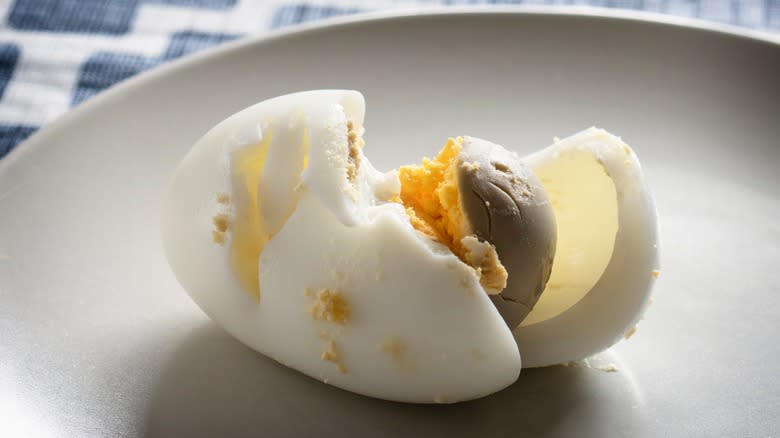
There's a rumor out there that overcooked green or gray yolks are dangerous to eat. However, according to the USDA, overcooked green yolks are perfectly safe to eat.
Some of the misconceptions about green yolks seem to relate to a misunderstanding about the chemical reactions that happen during the cooking process. When people hear that sulfur in egg whites break down during cooking and create hydrogen sulfide gas, they panic and think overcooked ones are just as likely to release this potentially toxic gas. However, as the hydrogen sulfide in the white portion gets hotter, it moves toward the yolk and combines with the iron there to make harmless (if unsightly) iron sulfide. Moreover, eggs are highly unlikely to contain enough of this gas to cause real harm. As per the Minnesota Department of Health, it has to be around in high concentrations to hurt someone, which is more likely in industrial areas and sewers, not your kitchen.
So, finding that your yolk is green is actually a good thing. It's an indication that hydrogen sulfide that had been lurking inside the shell has transformed into a non-toxic chemical. That's why you don't hear of people regularly dying or being hospitalized from eating cooked eggs that were in some sort of limbo state. So, go ahead and eat that overcooked green yolk, and cook up some ham while you're at it to have a full Doctor Seuss-themed meal.
False: Incredibly Long-Cooked Eggs Are Impossible To Eat
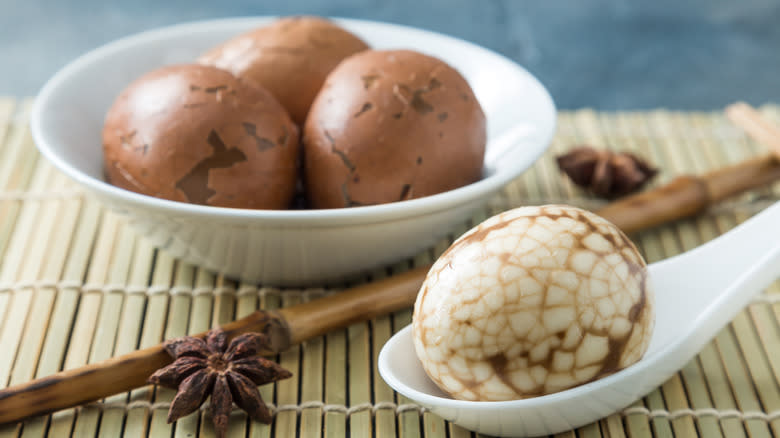
You might be surprised to learn that some people overcook their eggs on purpose. You will find several long-cooked eggs in culinary traditions around the world. The secret is that chefs cook these eggs low and slow rather than at a full boil, so that the texture can change in a more positive way during the cooking process.
For example, some Jewish people eat long-cooked eggs as a kind of loophole for the religious law that forbids working on the Sabbath. Since cooks can start the cooking process the day before the Sabbath, they're technically not doing any work but showing them to continue cooking on the Sabbath itself. For Ashkenazi people descended from Central and Eastern European ancestors, the eggs may be cooked in a stew called cholent or hamin that simmers overnight to eat the next day.
Sephardic Jews, many of whom have Spanish or Portuguese ancestry, have another version of slow-cooked eggs called huevos haminados. The long cooking time using low temperatures turns eggs extremely soft with light brown whites and pale yellow yolks. They also have a nice flavor from a combination of coffee grounds (or tea leaves), garlic, onion skins, and vinegar that's been added to the pot. Another variation you'll find in Morocco is the 300-minute egg that bakes in the oven or roasts in the sand for five hours. Meanwhile, in China, tea eggs are cooked at low temperatures for over an hour.
False: Overcooked Eggs Taste The Same As Regular Eggs
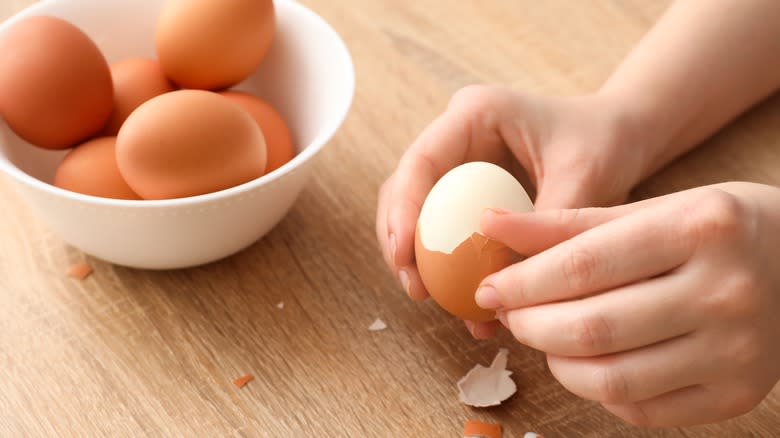
No matter how you cook them, the structure and color of your overcooked eggs will practically always change. And with those changes come shifts in flavor. The first happens when the yolks turn green. If you cook the eggs long enough, you'll experience another flavor change when the whites turn light brown.
Many people actually prefer overcooked yolks because they believe that the greenish-grey yolks have a better flavor. In fact, some people purposefully choose a longer cooking time to make the yolk turn even darker.
When eggs are cooked long enough for the whites to turn brown from the Maillard reaction, the flavor changes even further. Just like the flavor of bread or even cheese changes after browning, so does the flavor of whites change as they change colors. For eggs, the flavor transforms to toasty, nutty, and maybe even meaty.
So, if you find that you've overcooked your eggs by a few minutes and you don't plan to eat them right away, you might as well consider turning the temperature down and cooking them for a few more hours to experience this potentially positive flavor change.
False: There's No Way To Salvage The Texture Of An Overcooked Egg
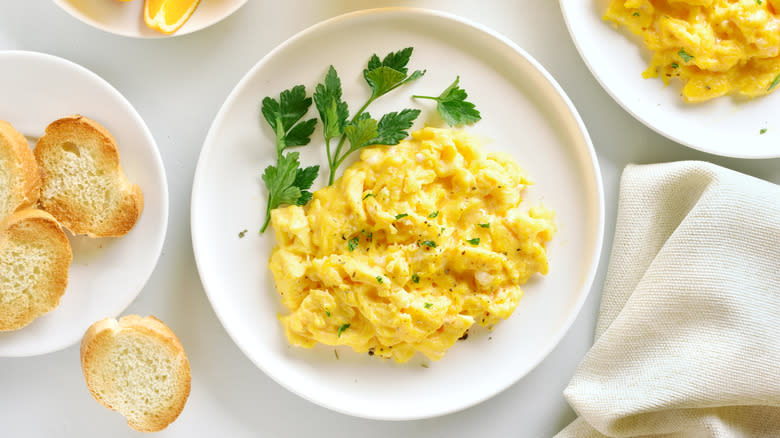
If you accidentally overcook your eggs, you'll find that the flavor and texture will have changed. At around the 15-minute mark, the yolk will start to dry out and have more of a grainy texture. The longer you cook those eggs, the harder and more rubbery the white will become as well. However, don't run them to the garbage can just try. All is not lost if you end up with dry, rubbery eggs.
The most important thing you can do for an overcooked egg that you still want to use is to find a way to incorporate some type of liquid into it. Overcooked scrambled eggs may smell like a wet dog, but you don't have to trash them if you have some type of creamy substance to add to the mix, like milk, butter, or cream cheese. Liquid can transform them from dry to moist again, though the texture admittedly won't be the same. Salvaging overcooked boiled eggs also requires a bit of liquid or a similar creamy substance, whether you crack them open and just add moisture to the yolk (perhaps while making deviled eggs) or dunk the whole thing into some type of liquid that it can hopefully absorb.
False: There Aren't Any Good Uses For Overcooked Eggs
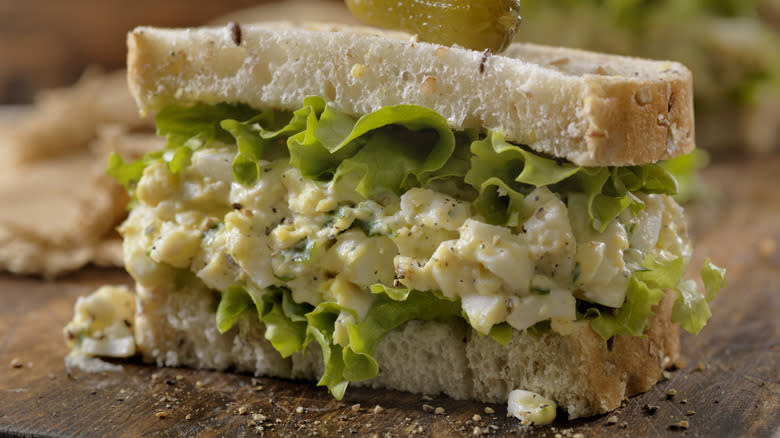
Though it may seem surprising, there are plenty of uses for overcooked eggs, no matter how you've cooked them. Adding liquids or creamy substances can help moisten the eggs again. While you may not want to eat them the way you planned after you've cooked them for too long, they're still useful and edible. Sometimes, you can salvage them with ease, while other times, you will need to repurpose those eggs completely.
For example, overcooked scrambled eggs aren't a lost cause. You can add milk or cream cheese to them to reintroduce moisture. Not only will they regain some lost liquid, but the additional ingredients can help to improve the flavor. As for ones you've boiled too long, try chopping them up to use in egg-based dishes like egg salad, potato salad, and tuna salad. These will likely contain creamy ingredients like mayonnaise that can counteract dry overcooked eggs.
You could even turn the boiled variety into deviled eggs, at least as long as the whites haven't become too rubbery. Another option is to place overcooked eggs into a casserole where they can absorb the liquids inside the dish. You can also throw them into a soup or curry where they can likewise absorb more liquid. If none of these ideas sound appealing, you can always feed them to your protein-loving canine, though the American Kennel Club urges you to check in with their vet first, just in case.
False: There's No Way To Get Rid Of The Sulfurous Smell Of Overcooked Eggs
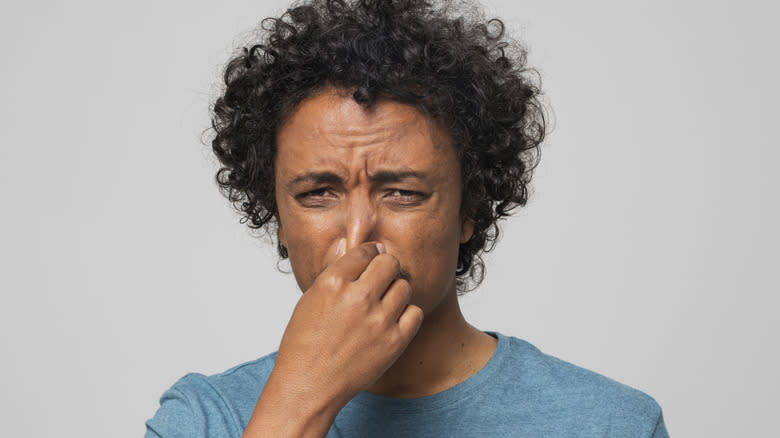
As you now know, boiling eggs for too long can result in yolks that turn green. That's courtesy of a chemical reaction that creates iron sulfide in the yolk. If you can't guess from the name of this chemical, the process that turns yolks green will also cause those overcooked eggs to take on something of a sulfurous smell. Since it's the smell we often also associate with rotten eggs and rank body odor, it's not necessarily an odor we want to go along with our food. Luckily, you don't have to endure egg salad or deviled eggs that stink, even if you want to use to overcooked eggs. That's because there's a way you might be able to get rid of that stinky sulfurous smell.
Getting rid of the smell is so easy that you'll wonder why you didn't think of it sooner. All you have to do is remove the greenish-grey part of the yolk, which is typically just a thin layer. Do that, and the smell will plague you no more. Just throw away the green bit and keep the yellow, and whatever you're using them in will be less smelly (though sensitive palates may still detect a tinge of the odor).
False: Overcooked Eggs Have The Same Nutrients As Regular Eggs
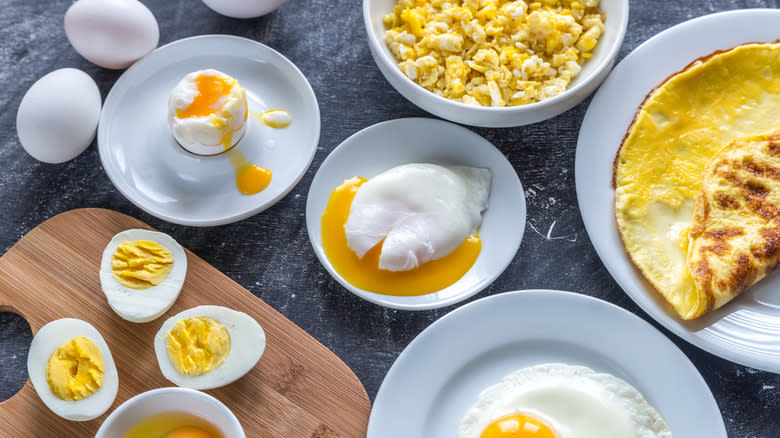
Eggs are packed with all kinds of vitamins and minerals, as well as healthy fats and proteins. Cooking is nutritionally good for eggs. However, there's a point where you negatively affect the nutritional content of eggs when you overcook them.
A clinical trial published in The Journal of Nutrition revealed that the proteins in cooked eggs are easier to digest than in raw eggs, so cooking them is good for reasons other than eliminating dangerous microbes. Heating also makes vitamin B7 (biotin) available for your body to utilize (per Healthline).
While cooking is good in some respects, several nutrient levels start to decline when you start to overcook eggs. Moreover, the longer you cook them, the more nutrients they lose. For example, a study published in the journal Food Chemistry showed that cooking eggs for 40 minutes in the oven caused them to lose 55% to 61% of their initial amount of vitamin D. Naturally enough, shorter cooking times meant that they lost fewer nutrients.
False: Overcooking Happens At The Same Time For Every Type Of Egg
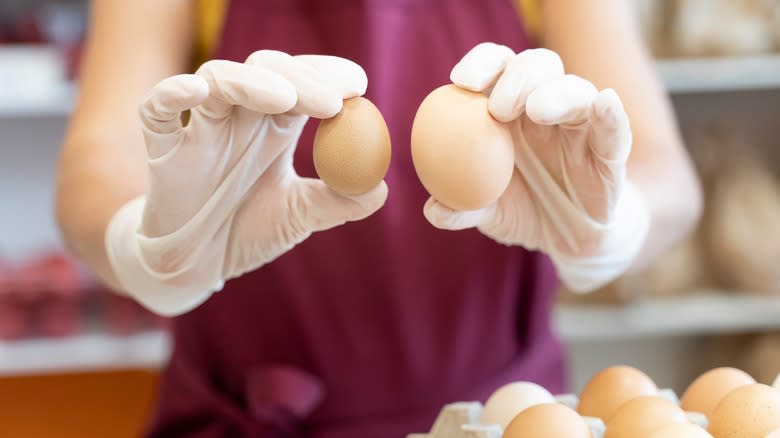
Eggs come in a variety of sizes, and so it follows that the amount of time they need to cook will vary based on how big they are, with smaller eggs taking less time to reach doneness than larger ones. Thus, overcooking will happen at different times for different sizes.
The majority of the eggs that you will find at the grocery store will be classified as medium, large, or extra large. If you've never paid attention to the size you buy before, it's a good idea to take a look now, especially if you're concerned about overcooking them. A medium one will be done in about 12 minutes, a large one will be done in 15 minutes, and an extra-large one will be done in 18 minutes.
When you see instructions telling you how long to cook eggs, pay attention to the size you have. If the recipe asks you to boil for 18 minutes because the writer was using extra large eggs, you can easily end up overcooking them if you use medium-sized ones instead.
False: An Ice Bath Can't Prevent Overcooking
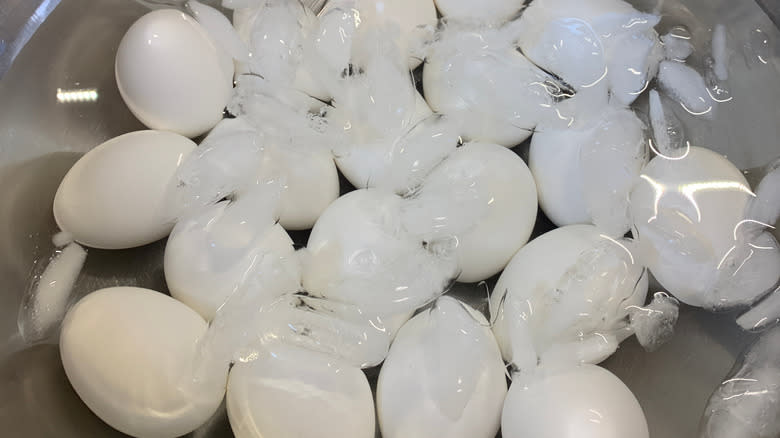
There are multiple reasons why you want to plunge a just-boiled egg straight into a bowl of ice water, including preventing overcooking. That's because, when the cooking time is over and you pull those eggs out of the boiling water, the cooking process doesn't end, because temperature is still hot inside the shell. Thus, that egg will continue to cook. The fastest way to bring an egg's temperature down so that it stops cooking is to take it out of the boiling water and immediately place it in an ice bath. If you've nearly reached the point of overcooking eggs, you just might be able to salvage them with an immediate ice bath.
Ice baths are useful for other purposes, too. Some cooks swear that keeping boiled eggs in ice water for around 15 minutes will make peeling the shells easier. Plus, the overall structure of the proteins can tighten up in a cold bath, potentially preventing misshapen eggs. With a simple bowl of ice water at the ready, you can not only prevent eggs from overcooking, but you can also have prettier results and less aggravation when it comes to peeling them.
False: There's No Way To Prevent Textural Problems With Overcooked Scrambled Eggs
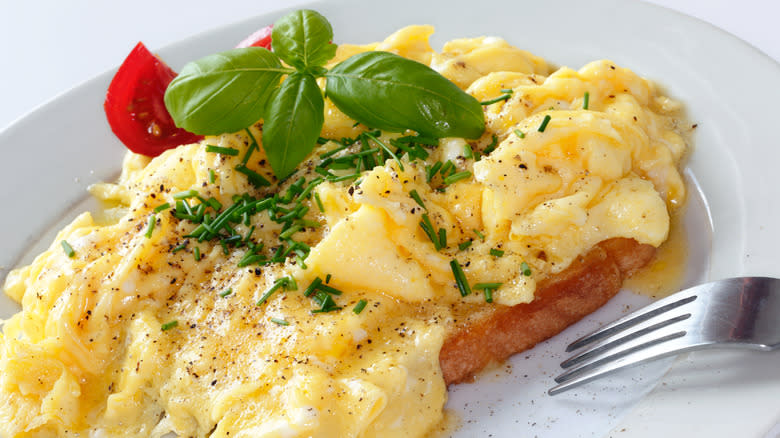
Even if you've been scrambling eggs nearly all your life and could practically do it in your sleep, there's still a chance of that you could overcook them. That's because scrambled eggs can go from perfectly moist to overcooked in mere seconds, even if you're paying close attention to what you're doing. However, there's a secret to prevent this overcooking.
To ensure that your scrambled eggs stay creamy even if you accidentally cook them too long, consider adding a starchy slurry before the eggs hit the pan. You could make this slurry from a combination of water and cornstarch, potato starch, or tapioca starch. Potato and tapioca starches will produce slightly creamier eggs if that's your goal.
This method works because the starches help prevent the proteins in the eggs from coagulating. What's more, the starch holds onto water in the eggs, keeping it from totally evaporating. You can use this technique to prevent overcooking a bevy of other egg dishes, like omelets and egg foo young.
Read the original article on Mashed.

